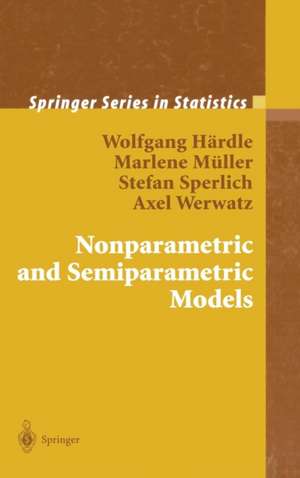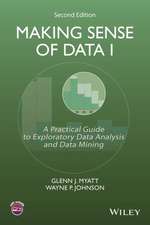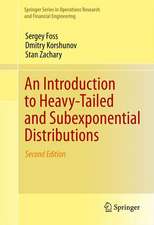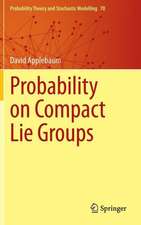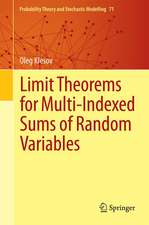Nonparametric and Semiparametric Models: Springer Series in Statistics
Autor Wolfgang Karl Härdle, Marlene Müller, Stefan Sperlich, Axel Werwatzen Limba Engleză Hardback – 22 mar 2004
| Toate formatele și edițiile | Preț | Express |
|---|---|---|
| Paperback (1) | 1109.62 lei 6-8 săpt. | |
| Springer Berlin, Heidelberg – 20 aug 2012 | 1109.62 lei 6-8 săpt. | |
| Hardback (1) | 1114.52 lei 6-8 săpt. | |
| Springer Berlin, Heidelberg – 22 mar 2004 | 1114.52 lei 6-8 săpt. |
Din seria Springer Series in Statistics
- 14%
 Preț: 679.60 lei
Preț: 679.60 lei - 20%
 Preț: 630.97 lei
Preț: 630.97 lei - 20%
 Preț: 816.43 lei
Preț: 816.43 lei - 20%
 Preț: 1000.84 lei
Preț: 1000.84 lei -
 Preț: 390.84 lei
Preț: 390.84 lei - 20%
 Preț: 697.13 lei
Preț: 697.13 lei - 20%
 Preț: 533.34 lei
Preț: 533.34 lei - 20%
 Preț: 884.68 lei
Preț: 884.68 lei - 18%
 Preț: 1237.14 lei
Preț: 1237.14 lei - 18%
 Preț: 961.82 lei
Preț: 961.82 lei - 18%
 Preț: 956.50 lei
Preț: 956.50 lei - 18%
 Preț: 794.25 lei
Preț: 794.25 lei - 15%
 Preț: 648.05 lei
Preț: 648.05 lei - 18%
 Preț: 1217.10 lei
Preț: 1217.10 lei - 15%
 Preț: 646.11 lei
Preț: 646.11 lei - 15%
 Preț: 647.08 lei
Preț: 647.08 lei - 15%
 Preț: 646.11 lei
Preț: 646.11 lei - 18%
 Preț: 1329.76 lei
Preț: 1329.76 lei - 15%
 Preț: 652.81 lei
Preț: 652.81 lei - 18%
 Preț: 952.40 lei
Preț: 952.40 lei - 18%
 Preț: 1333.42 lei
Preț: 1333.42 lei - 18%
 Preț: 1561.68 lei
Preț: 1561.68 lei - 18%
 Preț: 1231.47 lei
Preț: 1231.47 lei - 15%
 Preț: 513.64 lei
Preț: 513.64 lei - 18%
 Preț: 893.71 lei
Preț: 893.71 lei - 15%
 Preț: 649.87 lei
Preț: 649.87 lei - 18%
 Preț: 1007.65 lei
Preț: 1007.65 lei - 18%
 Preț: 1111.67 lei
Preț: 1111.67 lei - 18%
 Preț: 1223.70 lei
Preț: 1223.70 lei - 18%
 Preț: 892.74 lei
Preț: 892.74 lei - 18%
 Preț: 913.26 lei
Preț: 913.26 lei - 18%
 Preț: 943.88 lei
Preț: 943.88 lei -
 Preț: 391.61 lei
Preț: 391.61 lei -
 Preț: 391.22 lei
Preț: 391.22 lei - 18%
 Preț: 1331.18 lei
Preț: 1331.18 lei -
 Preț: 390.84 lei
Preț: 390.84 lei - 18%
 Preț: 888.45 lei
Preț: 888.45 lei - 18%
 Preț: 960.61 lei
Preț: 960.61 lei - 18%
 Preț: 1245.34 lei
Preț: 1245.34 lei - 18%
 Preț: 964.54 lei
Preț: 964.54 lei - 15%
 Preț: 643.16 lei
Preț: 643.16 lei - 18%
 Preț: 1723.76 lei
Preț: 1723.76 lei - 15%
 Preț: 643.84 lei
Preț: 643.84 lei - 15%
 Preț: 586.37 lei
Preț: 586.37 lei - 18%
 Preț: 999.59 lei
Preț: 999.59 lei - 15%
 Preț: 643.34 lei
Preț: 643.34 lei - 18%
 Preț: 806.40 lei
Preț: 806.40 lei - 18%
 Preț: 727.66 lei
Preț: 727.66 lei
Preț: 1114.52 lei
Preț vechi: 1359.17 lei
-18% Nou
Puncte Express: 1672
Preț estimativ în valută:
213.26€ • 223.26$ • 176.46£
213.26€ • 223.26$ • 176.46£
Carte tipărită la comandă
Livrare economică 05-19 aprilie
Preluare comenzi: 021 569.72.76
Specificații
ISBN-13: 9783540207221
ISBN-10: 3540207228
Pagini: 328
Ilustrații: XXVII, 300 p.
Dimensiuni: 155 x 235 x 22 mm
Greutate: 0.61 kg
Ediția:2004
Editura: Springer Berlin, Heidelberg
Colecția Springer
Seria Springer Series in Statistics
Locul publicării:Berlin, Heidelberg, Germany
ISBN-10: 3540207228
Pagini: 328
Ilustrații: XXVII, 300 p.
Dimensiuni: 155 x 235 x 22 mm
Greutate: 0.61 kg
Ediția:2004
Editura: Springer Berlin, Heidelberg
Colecția Springer
Seria Springer Series in Statistics
Locul publicării:Berlin, Heidelberg, Germany
Public țintă
ResearchCuprins
1 Introduction.- 1.1 Density Estimation.- 1.2 Regression.- Summary.- I Nonparametric Models.- 2 Histogram.- 3 Nonparametric Density Estimation.- 4 Nonparametric Regression.- II Semiparametric Models.- 5 Semiparametric and Generalized Regression Models.- 6 Single Index Models.- 7 Generalized Partial Linear Models.- 8 Additive Models and Marginal Effects.- 9 Generalized Additive Models.- References.- Author Index.
Recenzii
From the reviews:
"This book contains a good coverage of some of the widely used nonparametric and semiparametric modeling techniques. … The concepts are presented very clearly with numerous examples and data analytic illustrations. … Authors have done a good job of illustrating the concepts and the methodology with very well chosen examples. The exercises at the end of each chapter are carefully prepared so that students become familiar with the important issues. This book will be very useful for students in statistics, biostatistics and econometrics." (Probal Chaudhuri, Sankhya, Vol. 67 (1), 2005)
"This is another book by Professor Wolfgang Härdle and his colleagues on nonparametric statistics and smoothing. The unique feature of this book is the inclusion of topics on semi-parametric regression models for high-dimensional data. … Minimum theory and numerical examples are covered in this book, which makes this book mostly suitable for a course in nonparametric regression to graduate students. … will be useful for readers who would like to understand the statistical and mathematical principles and basic concepts and techniques of smoothing." (Dongsheng Tu, Zentralblatt MATH, Vol. 1059 (10), 2005)
"This book deals with the problem of how to estimate … . As such the problems that it deals with are closely related to the exploratory data analysis techniques … . The text is well organized, with some exercises, which in the later sections of the book have the character of research theses. Each chapter ends with a useful summary, and the notation is summarized at the beginning of the book. … would be good for those wanting to catch up with recent developments in this field." (Mark P. Little, Journal of the Royal Statistical Society, Vol. 168 (4), 2005)
"The book is very well written and a pleasure to read with the methods fully illustrated. At the end of each chapter is a valuable summary of the important formulae andmethods introduced in the chapter. The book progresses by first motivating, then developing methodology, and finally providing statistical properties." (T.P. Hettmansperger, Short Book Reviews, Vol. 24 (3), 2004)
"This book, part of the Springer Series in Statistics, is a detailed, mathematical presentation of smoothing techniques … . Each chapter ends with a summary of key issues and findings that were presented earlier and serves as an excellent review for the reader. Finally, bibliographic notes at the end of each chapter often provide good historic perspective … . This book is a thorough and complete reference on modeling techniques … . a useful source on the theory associated with smoothing algorithms and testing." (Robert Lordo, Technometrics, Vol. 47 (2), May, 2005)
"This book contains a good coverage of some of the widely used nonparametric and semiparametric modeling techniques. … The concepts are presented very clearly with numerous examples and data analytic illustrations. … Authors have done a good job of illustrating the concepts and the methodology with very well chosen examples. The exercises at the end of each chapter are carefully prepared so that students become familiar with the important issues. This book will be very useful for students in statistics, biostatistics and econometrics." (Probal Chaudhuri, Sankhya, Vol. 67 (1), 2005)
"This is another book by Professor Wolfgang Härdle and his colleagues on nonparametric statistics and smoothing. The unique feature of this book is the inclusion of topics on semi-parametric regression models for high-dimensional data. … Minimum theory and numerical examples are covered in this book, which makes this book mostly suitable for a course in nonparametric regression to graduate students. … will be useful for readers who would like to understand the statistical and mathematical principles and basic concepts and techniques of smoothing." (Dongsheng Tu, Zentralblatt MATH, Vol. 1059 (10), 2005)
"This book deals with the problem of how to estimate … . As such the problems that it deals with are closely related to the exploratory data analysis techniques … . The text is well organized, with some exercises, which in the later sections of the book have the character of research theses. Each chapter ends with a useful summary, and the notation is summarized at the beginning of the book. … would be good for those wanting to catch up with recent developments in this field." (Mark P. Little, Journal of the Royal Statistical Society, Vol. 168 (4), 2005)
"The book is very well written and a pleasure to read with the methods fully illustrated. At the end of each chapter is a valuable summary of the important formulae andmethods introduced in the chapter. The book progresses by first motivating, then developing methodology, and finally providing statistical properties." (T.P. Hettmansperger, Short Book Reviews, Vol. 24 (3), 2004)
"This book, part of the Springer Series in Statistics, is a detailed, mathematical presentation of smoothing techniques … . Each chapter ends with a summary of key issues and findings that were presented earlier and serves as an excellent review for the reader. Finally, bibliographic notes at the end of each chapter often provide good historic perspective … . This book is a thorough and complete reference on modeling techniques … . a useful source on the theory associated with smoothing algorithms and testing." (Robert Lordo, Technometrics, Vol. 47 (2), May, 2005)
Textul de pe ultima copertă
The concept of nonparametric smoothing is a central idea in statistics that aims to simultaneously estimate and modes the underlying structure. The book considers high dimensional objects, as density functions and regression. The semiparametric modeling technique compromises the two aims, flexibility and simplicity of statistical procedures, by introducing partial parametric components. These components allow to match structural conditions like e.g. linearity in some variables and may be used to model the influence of discrete variables.
The aim of this monograph is to present the statistical and mathematical principles of smoothing with a focus on applicable techniques. The necessary mathematical treatment is easily understandable and a wide variety of interactive smoothing examples are given.
The book does naturally split into two parts: Nonparametric models (histogram, kernel density estimation, nonparametric regression) and semiparametric models (generalized regression, single index models, generalized partial linear models, additive and generalized additive models). The first part is intended for undergraduate students majoring in mathematics, statistics, econometrics or biometrics whereas the second part is intended to be used by master and PhD students or researchers.
The material is easy to accomplish since the e-book character of the text gives a maximum of flexibility in learning (and teaching) intensity.
The aim of this monograph is to present the statistical and mathematical principles of smoothing with a focus on applicable techniques. The necessary mathematical treatment is easily understandable and a wide variety of interactive smoothing examples are given.
The book does naturally split into two parts: Nonparametric models (histogram, kernel density estimation, nonparametric regression) and semiparametric models (generalized regression, single index models, generalized partial linear models, additive and generalized additive models). The first part is intended for undergraduate students majoring in mathematics, statistics, econometrics or biometrics whereas the second part is intended to be used by master and PhD students or researchers.
The material is easy to accomplish since the e-book character of the text gives a maximum of flexibility in learning (and teaching) intensity.
